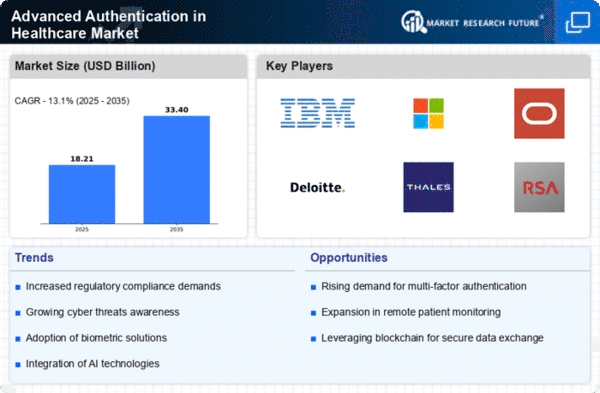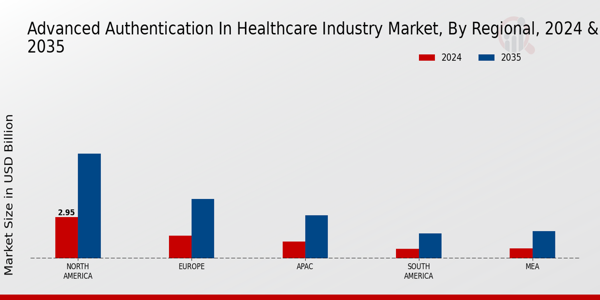Market Growth Projections
The Global Advanced Authentication in Healthcare Market Industry is poised for substantial growth, with projections indicating a rise from 6.22 USD Billion in 2024 to 15.6 USD Billion by 2035. This growth is underpinned by a compound annual growth rate (CAGR) of 8.72% from 2025 to 2035. The increasing need for secure access to patient data, driven by regulatory compliance and rising cybersecurity threats, is likely to propel the demand for advanced authentication solutions. As healthcare organizations prioritize data security, the market is expected to expand, reflecting the critical importance of advanced authentication in safeguarding sensitive information.
Rising Cybersecurity Threats
The Global Advanced Authentication in Healthcare Market Industry is increasingly driven by the rising threats posed by cyberattacks. Healthcare organizations are prime targets due to the sensitive nature of patient data. In 2024, the market is projected to reach 6.22 USD Billion, highlighting the urgent need for robust authentication solutions. As cyber threats evolve, healthcare providers are compelled to adopt advanced authentication methods to safeguard patient information and comply with regulations. This trend suggests a growing recognition of the importance of cybersecurity in healthcare, potentially leading to a more secure environment for patient data.
Regulatory Compliance Requirements
Regulatory compliance is a significant driver for the Global Advanced Authentication in Healthcare Market Industry. Healthcare organizations are mandated to adhere to stringent regulations such as HIPAA in the United States, which necessitates the implementation of advanced authentication mechanisms to protect patient data. As compliance requirements become more rigorous, the demand for sophisticated authentication solutions is likely to increase. This trend may contribute to the market's growth, with projections indicating a rise to 15.6 USD Billion by 2035. Organizations that fail to comply risk facing severe penalties, thereby emphasizing the critical role of advanced authentication in maintaining regulatory standards.
Increased Adoption of Telehealth Services
The Global Advanced Authentication in Healthcare Market Industry is experiencing growth due to the increased adoption of telehealth services. As healthcare providers expand their digital offerings, the need for secure access to patient data becomes paramount. Advanced authentication solutions are essential to ensure that only authorized personnel can access sensitive information, thereby protecting patient privacy. This trend is likely to drive market growth, as organizations seek to enhance their telehealth platforms. The anticipated compound annual growth rate (CAGR) of 8.72% from 2025 to 2035 suggests that the integration of advanced authentication in telehealth will be a key focus area for healthcare providers.
Growing Patient Awareness and Demand for Privacy
Patient awareness regarding data privacy is a crucial driver in the Global Advanced Authentication in Healthcare Market Industry. As individuals become more informed about their rights and the importance of data protection, they are demanding greater security measures from healthcare providers. This heightened awareness is prompting organizations to invest in advanced authentication technologies to build trust and ensure patient confidentiality. The market's growth trajectory, projected to reach 15.6 USD Billion by 2035, indicates that healthcare providers are responding to these demands by implementing robust authentication solutions that align with patient expectations for privacy and security.
Technological Advancements in Authentication Solutions
Technological advancements play a pivotal role in shaping the Global Advanced Authentication in Healthcare Market Industry. Innovations such as biometric authentication, multi-factor authentication, and artificial intelligence are enhancing the security of healthcare systems. These advancements not only improve the efficiency of authentication processes but also bolster the overall security framework within healthcare organizations. As technology evolves, the market is expected to grow significantly, with a projected value of 6.22 USD Billion in 2024. The continuous development of sophisticated authentication solutions is likely to attract investments and drive further growth in the industry.


























